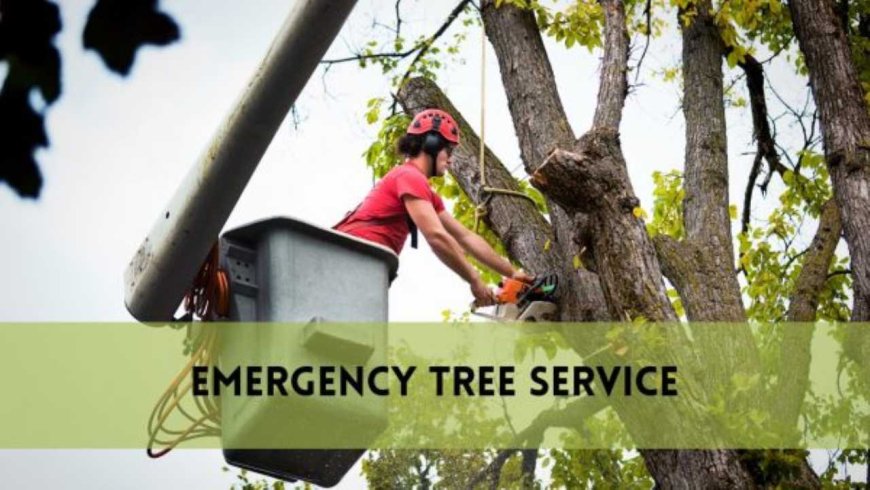Emergency Tree Removal: When Every Second Counts
Emergency tree removal isn’t something you plan for — but it’s definitely something you should be prepared for. A leaning or fallen tree can turn your peaceful yard into a disaster zone in seconds.

Picture this: a thunderstorm just swept through your neighborhood, and theres now a massive tree limb lying across your driveway or worse, leaning against your home. Thats not a tomorrow problem. Thats an emergency tree removal situation that needs attention right now.
What is Emergency Tree Removal?
Emergency tree removal is exactly what it sounds like removing a tree (or major limb) immediately due to an urgent threat to people, property, or public safety.
Key Differences from Standard Tree Removal
Regular removals are scheduled and planned. Emergency removals? Theyre fast, unplanned, and often happen under dangerous conditions.
When Does Tree Removal Become an Emergency?
-
Tree has already fallen
-
Tree is cracked or leaning dangerously
-
Its obstructing access or utilities
-
There's immediate risk of injury or property damage
Common Reasons for Emergency Tree Removal
Storm Damage
High winds, heavy rain, or snow can snap limbs or topple entire trees.
Fallen Trees on Property
If a tree falls onto your home, driveway, car, or power lines thats a clear emergency.
Risk to People or Pets
Unstable trees near play areas, sidewalks, or homes are ticking time bombs.
Root Damage or Uprooting
When roots lift from the soil or are exposed due to erosion, the whole tree could go down any minute.
Diseased or Dead Trees
If the structure is weakened by disease or rot, trees can fall with no warning.
Signs You Need Emergency Tree Removal
Dont wait for the tree to fall watch for warning signs:
Cracks in the Trunk
Deep vertical cracks often signal a split is coming soon.
Trees Leaning Suddenly
A tree that starts leaning overnight is in danger of falling.
Broken or Hanging Limbs
Especially those dangling above rooftops, cars, or walkways.
Visible Root Uplift
Raised soil or roots sticking out of the ground show instability.
Unstable Trees After Construction
Excavation near trees can damage roots, making the tree unsafe.
What to Do in a Tree Emergency
Stay Calm and Stay Safe
Keep people and pets away from the danger zone.
Clear the Area
Avoid walking near the tree or under hanging branches.
Call a Professional Tree Service
Dont delay. Time matters when property or lives are at risk.
Avoid DIY Removal
Chainsaws and ladders arent a good idea in an emergency leave it to the pros.
How Emergency Tree Removal Works
Initial Assessment
The crew inspects the tree and surrounding area to plan the safest approach.
Safety Measures and Equipment
Expect gear like ropes, harnesses, cranes, and even cherry pickers for tall jobs.
Step-by-Step Removal Process
-
Stabilize the area
-
Cut in sections
-
Lower large pieces carefully
-
Remove stump (if needed)
Debris Cleanup and Disposal
Most companies haul away everything some even offer wood chipping or firewood splitting.
Importance of Fast Response
Minimizing Property Damage
The sooner the tree is removed, the less chance it causes more harm.
Preventing Injuries
Falling branches or trees are serious hazards dont take the risk.
Avoiding Insurance Issues
Quick action can support your insurance claim and reduce out-of-pocket costs.
Choosing the Right Emergency Tree Removal Company
What to Look For
-
Licensed and insured
-
Experienced in emergency work
-
Equipped with the right tools
-
Fast response time
Questions to Ask Before Hiring
-
Are you available 24/7?
-
Do you offer free estimates?
-
Is cleanup included in the service?
24/7 Availability and Response Time
Emergencies dont wait for business hours your tree service shouldnt either.
Cost of Emergency Tree Removal
Factors Affecting the Price
-
Tree size and location
-
How dangerous or urgent the job is
-
Equipment needed
-
Time of day (nights and weekends cost more)
Typical Cost Ranges
-
Small trees: $300$700
-
Medium trees: $700$1,500
-
Large or high-risk trees: $2,000+
Insurance Coverage Possibilities
If the tree caused damage or blocked access, your homeowners insurance might cover part or all of the cost.
Preventing Future Tree Emergencies
Regular Tree Inspections
Spot problems before they become dangerous.
Professional Tree Pruning
Keeps limbs balanced, strong, and less likely to snap in storms.
Tree Risk Assessments
Arborists can evaluate the structural integrity of trees on your property.
Conclusion
Emergency tree removal isnt something you plan for but its definitely something you should be prepared for. A leaning or fallen tree can turn your peaceful yard into a disaster zone in seconds. When that happens, calling a qualified emergency tree service is the fastest and safest way to fix the problem and protect your home. Dont wait until its too late if your tree looks risky, take action now.
FAQs
1. Is emergency tree removal covered by homeowners insurance?
It often is especially if the tree caused damage to structures or blocked driveways. Check your policy.
2. Can I remove a fallen tree myself?
Only if it's small, safe, and not near anything valuable. Otherwise, hire a professional.
3. How fast can an emergency crew arrive?
Many services offer 24/7 dispatch and can arrive within 12 hours, depending on your location.
4. What if a neighbors tree falls on my property?
Your insurance usually covers it, but the neighbor may be liable if the tree was neglected.
5. Should I call 911 for a tree emergency?
Only if theres immediate danger to life, like downed power lines or blocked roads.









































